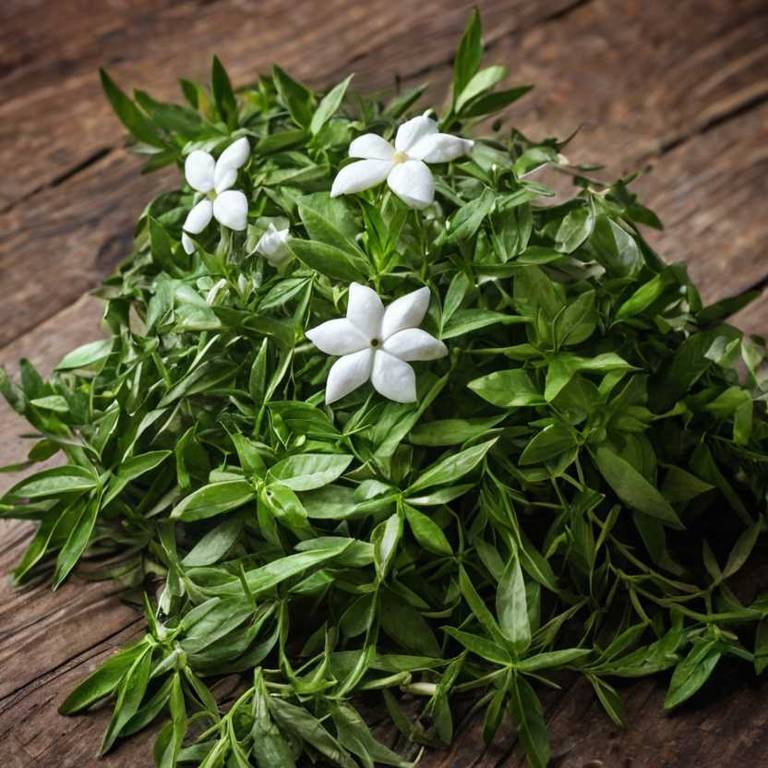Gardenia (Gardenia jasminoides)
Gardenia (Gardenia jasminoides) is a member of the Rubiaceae family, native to Southeast Asia, South China, and Indo-Malayan Region. Traditionally, its fruits, leaves, and bark have been used for infusions, decoctions, and powders.
This herb is particularly valued for its bitter, anti-inflammatory, and tonic actions, and has a long history of use in traditional chinese medicine, ayurvedic medicine, and japanese kampo medicine.

Quick Facts / Key Information
| Common Name | Gardenia |
|---|---|
| Scientific Name | Gardenia jasminoides |
| Plant Family | Rubiaceae |
| Genus | Gardenia |
| Species | jasminoides |
| Native Range | Southeast Asia, South China, Indo-Malayan Region |
| Plant Parts Used | Fruits, Leaves, Bark |
| Primary Medicinal Actions | Bitter, Anti-Inflammatory, Tonic |
| Primary Traditional Systems | Traditional Chinese Medicine, Ayurvedic Medicine, Japanese Kampo Medicine |
| Historical Preparation Methods | Infusion, Decoction, Powder |
Botanical Identity
- Scientific Name
- Gardenia jasminoides
- Common Name
- Gardenia
- Synonyms / Alternative Names
- Common Gardenia, Gardenia Jasminoides, Common Gardenia
- Plant Family
- Rubiaceae
- Genus
- Gardenia
Botanical Description
- Growth Habit
- Perennial herbaceous plant.
- Height
- It typically grows to a height of 1 to 3 meters.
- Leaves
- Simple leaves with acuminate tips, opposite phyllotaxy, upper surface glossy green, lower surface duller green, with prominent stomatal bands along the midrib.
- Flowers
- Inflorescences are solitary, actinomorphic flowers with white petals arranged in three whorls, each containing five elliptical lobes and a prominent central stamen cluster.
- Stems
- Erect, woody, branching in an alternate pattern, with smooth, glabrous surfaces and prominent leaf scars.
Traditional Uses / Historical Use
Traditional Systems
- Traditional Chinese Medicine
- Ayurvedic Medicine
- Japanese Kampo Medicine
Historical Preparation Methods
- Infusion
- Decoction
- Powder
- Tincture
Medicinal Actions
- Bitter
- Historically regarded as a calming bitter, for digestion-related formulations.
- Anti-inflammatory
- As described in traditional systems, a moderate anti-inflammatory, in inflammation-focused discussions.
- Tonic
- Traditionally described as a mild tonic, in general wellness contexts.
- Astringent
- In herbal literature, noted as a soothing astringent, for skin-related applications.
Active Compounds
- Flavonoid
- A group of naturally occurring compounds commonly present in many flowering plants.
- Glycoside
- Plant-produced compounds commonly stored in inactive glycosylated forms.
- Phenolic Acid
- Organic acids commonly occurring as part of plant secondary metabolism.
- Tannin
- Naturally occurring polyphenols widely distributed in woody and leafy plant parts.
Modern Research Overview
This section is reserved for future summaries of scientific research related to this plant. As additional verified sources are reviewed, relevant study information will be added here.
Safety & Contraindications
- General Precautions
- The use of this herb may warrant general caution in certain situations.
- Contraindications
- The use of this herb has been associated with reported contraindications in some situations.
- Allergies
- Reports of allergic reactions to this herb are not well documented in available sources.
- Drug Interactions
- There is insufficient evidence to determine whether this herb interacts with pharmaceutical drugs.
- Toxicity
- Toxic effects associated with this herb have not been well documented.
- Pregnancy & Breastfeeding
- Information addressing pregnancy and breastfeeding-related safety for this herb is limited.
Preparation & Usage Methods
- Infusion
- Dried or fresh plant parts are infused in hot water and consumed as a beverage.
- Decoction
- This method uses sustained heat to extract compounds from firm plant structures.
- Poultice
- Fresh or dried plant material is applied externally to the skin.
- Extract
- Non-alcoholic extracts provide a liquid form of plant constituents.
- Capsule
- Powdered plant material is enclosed in a capsule for oral consumption.
Growing, Harvesting & Storage
Growing / Cultivation
- Soil
- Prefers loamy soil with well-drained conditions. Typically grows best in high organic matter soils.
- Sunlight
- Thrives in partial shade. Tolerates partial shade to full shade.
- Watering
- Prefers consistently moist soils. Tolerates periodic dry conditions.
Medical Disclaimer
The information provided on this page is for educational and informational purposes only. It is not intended to diagnose, treat, cure, or prevent any medical condition. Always consult a qualified healthcare professional before using any herb for medicinal purposes.